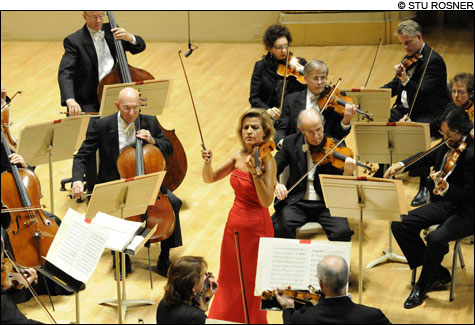
MUSICAL PRIORITIES Mutter got a standing ovation, but was this the best way to hear Mozart’s violin concertos? |
The season-opening concerts I've been going to have made me think about two kinds of musicians: those whose performances become transparent, who allow the listener into the heart of the music; and those for whom their own abilities — technical marvels — seem an end, not a means to a higher end. This latter category consists mainly of celebrity musicians who offer to the world the pleasure of encountering their proven gifts. The music itself is secondary, only the vehicle through which we can experience their star power. They attract the largest audiences and get the biggest ovations. It's not exactly that I think there's anything wrong with that. Why shouldn't we appreciate phenomenal prowess? But that's not why I love music. When I want to hear Mozart or Beethoven or Stravinsky, the performances I love most are the ones that let me see something in the music that I haven't seen before, or that let me see most clearly what I already love in the music. I'm most interested in piano playing or violin playing or conducting that transcends the performance.
This season, because of the sad departure of James Levine as music director of the Boston Symphony Orchestra, the season opened without a music director. Levine was apparently going to conduct a concerto with the glamorous German violinist Anne-Sophie Mutter, a frequent BSO guest. The BSO management decided to keep its commitment to Mutter without Levine, to open the season with neither a familiar elder statesman nor a young Turk who would arouse speculation about taking over the directorship, but with the violinist — clearly not a candidate for music director — conducting herself. The gala opening night would consist of two Mozart concertos, Numbers 3 and (the most demanding) 5, and at the subsequent subscription concert, the other three, Numbers 1, 2, and 4. A reduced orchestra of 24 players, strings plus pairs of oboes and horns, could easily handle the minimal technical challenges of supporting the soloist, though this would hardly show off the full strength of this great ensemble. Mutter has done this kind of thing before, even on recordings, and this complete Mozart violin concerto series would be a BSO first. A personal conflict forced me to miss the gala, but I think I got the picture after hearing the second concert, and for me it was a disappointing one, though the audience seemed to love it.
Mutter has said that no day goes by for her without Mozart, but I would never guess that from what I heard. Mozart composed his five violin concerts when he was about 19 (the first, despite the later number, actually precedes even the earliest of his piano concertos, which are on the whole on an infinitely higher level). Even at less than his greatest, though, Mozart can still be charming, playful, tender, elegant, imposing, graceful, poignant (do yourself a favor and find Joseph Szigeti's sublime 1934 recording of Number 4 under Thomas Beecham, or Pamela Frank's more recent one with David Zinman). But Mutter's Mozart was seldom more than well-played, and there were several places, especially at the beginning of the fourth concerto — the most beautiful if not the most ambitious of this series — where Mutter's tone was aggressively wiry and harsh.